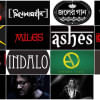‘Obak Bhalobasha’: 30 years later

Warfaze, one of the most celebrated bands in Bangladesh, turns 40 years old today. With albums, compositions, awards and several hits to their name, the band has contributed much to the music industry in Bangladesh. They have also played a vital role– through their melodies and lyrics– in keeping the Bengali language alive, thriving and evolving, over several generations and in countries all over the world, where Bengalis live and communicate accordingly.
Last week, the release of the Coke Studio Bangla version of the famous song, "Obak Bhalobasha", proved to many that certain compositions are here to stay forever, and also to be reborn generations later.

As the new version of the song crosses the six million mark, one can't help going back to the original version of the song, which was released in a self-titled album 30 years ago. The album was definitely a big hit, especially the song "Obak Bhalobasha". The unique elements that defined the composition– the beginning of the guitar solo, going on for minutes; sounds of waves crashing against the rocks at sea; not to mention, calls of seagulls flying above and then finally sliding into the words of a beautiful saga– had the younger ones asking for more.
Fast forward to almost three decades later, the release of the new version of "Obak Bhalobasha", now has a younger set of followers and music lovers. The song featured the current band members of Warfaze– Sheikh Monirul Alam Tipu (drums), Ibrahim Ahmed Kamal (lead guitar), Palash Noor (vocals), Samir Hafiz (lead guitar), Naim Haque Roger (bass guitar) and Shams Mansoor Ghani (keyboard). The very talented Babna Karim, a former member of the band and also the original creator of the song, was flown in from the US to perform with the band. The song also featured a host of gifted musicians who played and vocalised alongside the band.
"It was Arnob who got in touch with me last November regarding Coke Studio Bangla Season 3," says Tipu. "They were planning to feature Warfaze in one of the episodes. Once we agreed to the terms and conditions, we began with the preparation for the production."
Tipu adds that initially, the band was considering working on "Ekti Chele", yet another Warfaze hit. "Palash, the band's current vocalist, does a fantastic rendition of the song," says Tipu, adding, "And we all thought that the song would be perfect. However, the Coke Studio team wanted 'Obak Bhalobasha' instead. After much thought, we went with Coke's decision and immediately got in touch with Babna Karim, the original creator of the song."
The entire production was nothing less than a team effort, says Tipu, where Arnob, Samir and himself worked on the production of the new version.
The visuals for "Obak Bhalobasha" were directed by Krishnendu Chattopadhyay of Dope Productions. At least 300 kilograms of sand was used to build the set of "Obak Bhalobasha". With the art director Shihab Nur and costume designer Nishat Disha, Krishnendu and his team pulled off a unique design consisting of the sea in Cox's Bazaar, a cosy cafe called Angel Drop and Dusk, reflecting off a bluish hue.
"'Obak Bhalobasha' has always reminded me of clear night skies filled with stars, against the calm sea," says Krishnendu, also a fan who grew up listening to the song. "Which is why we went for a blue and white tone where the visuals were concerned," he says. The director also adds that live shoots are always quite taxing and demanding. Looking at the bright side, however, Krishnendu spoke about how on set, the audio and the video teams had eventually become a single team to overcome the technical challenges.
Babna Karim, the lyricist and composer of "Obak Bhalobasha", remembers writing the song on February 29, 1992, a couple of years before it was released. "I first created the melody and the lyrics followed later," he says.
After the release of the self-titled album in 1994, the band found out about the Coca-Cola Band Music Award and was adamant about participating in the competition with the submission of their newly released song "Obak Bhalobasha". However, they were falling short of approximately Tk 3,500.
"The requirements were as follows: the song was to be submitted on five chrome cassettes; the lyrics of the song and the construct of the song," says Tipu. "Neither I nor Babna had the funds to do this, so I went to Kabir bhai from Rainbow Music Store. He immediately handed me the money and recorded the chrome cassettes himself."

As one can guess, the team won the competition and walked off with a cash prize of Tk 50,000. This, undoubtedly, motivated them to flourish and achieve more in the industry. Three decades later, it was as if fate reunited Coca-Cola and Warfaze for this new rendition of "Obak Bhalobasha" in the third season of Coke Studio Bangla.
"I simply loved everything about it!" says Babna, referring to the production and the set. "Also the blending between two different scales was done perfectly," he adds, noting the striking difference between the original and the new version of the song. "This was done because Palash and I sing on different keys."
The key shift that Babna Karim speaks of is the transition to an E minor from a C minor, while performing the new version live on set. Shifting of keys within a composition is sometimes done to add an artistic layer to a performance, where the tempo also goes through exciting changes. This is also done to make adjustments between two or more vocalists performing the composition. In this case, the shifting was done because of the latter.

"In the rendition, we moved from C minor to E minor– a total of four shifts!" Palash exclaims. This was done to create a comfortable space for both the vocalists to perform with ease. "Both Warfaze and Arnob had long discussions about how this transition would take place. Eventually, a point was reached where the transition for the instruments and vocals would be smooth. I definitely learnt a thing or two that day!" says Palash.
"Obak Bhalobasha" has been relevant for several generations and has created connections through the power of love and music. It is now time for the younger musicians to come forward and create new dimensions; and this will only be possible if the legends make way and welcome new ideas to the circle.
The author is a singer and journalist.

 For all latest news, follow The Daily Star's Google News channel.
For all latest news, follow The Daily Star's Google News channel. 










Comments